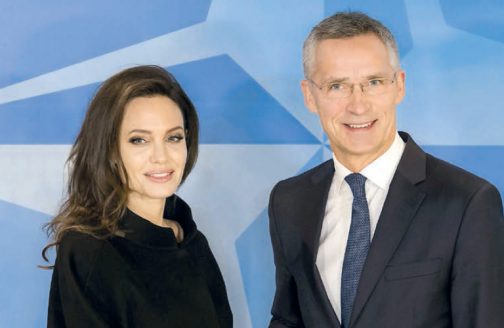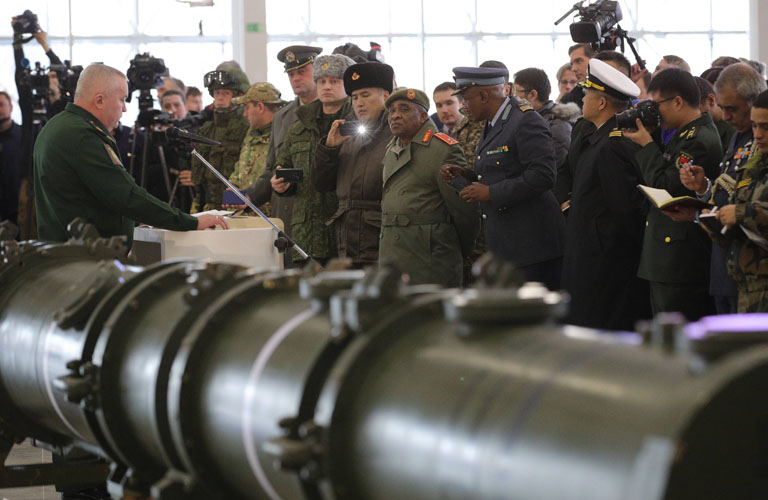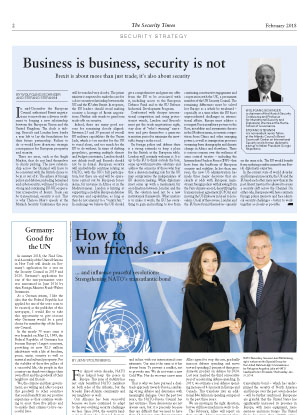How to win friends and influence peaceful resolutions: Strengthening NATO’s transatlantic bond

For almost seven decades, NATO has helped keep the peace in Europe. This zone of stability has not only benefitted NATO members on both sides of the Atlantic, but the broader Euro-Atlantic community and our neighbors as well.
Our Alliance has been successful because we have continued to adapt to the ever-evolving security challenges we face. Since 2014, the security landscape in Europe has changed dramatically, from Russia’s illegal annexation of Crimea to the turmoil and violence across North Africa and the Middle East. Terrorism continues to pose a serious threat to the safety and security of our citizens. This is true even though most of the territory controlled by the Islamic State has been liberated. We know that the fight against terrorism in not over.
We also know that cyber warfare presents a major challenge, potentially enabling adversaries to steal our information, disrupt our democracies and attack the infrastructure critical for our societies, including banking systems, health systems, power grids and air traffic control.
Allies have responded to these new and emerging threats with strength and speed. Over the past four years, NATO has implemented the biggest increase in our collective defense capabilities in a generation. We have transformed our ability to respond to a crisis, whether it is on land, at sea, in the air or from cyberspace. Our forces have increased their ability to move quickly where they are needed. And we have deployed multinational troops and equipment in the east of our Alliance to deter aggression. All of the steps we have taken have been strictly defensive, proportionate and in line with our international commitments. Our aim is the same as it has always been: To prevent a conflict, not to provoke one. We do not want a new Cold War. Nor do we want a new arms race.
That is why we have pursued a dual-track approach towards Russia, combining strong defense and deterrence with meaningful dialogue. Over the past two years, the NATO-Russia Council has met six times. These discussions are not always easy, but it is precisely because they are difficult that we need to have them. I believe it is critically important to keep channels of communication open, to increase transparency and to prevent misunderstandings and miscalculations from spiraling out of control. As we continue our adaptation to a more dangerous security environment, our summit in Brussels this July will be an important milestone. NATO leaders will make decisions about the next steps for our Alliance in five interrelated areas:
- Further strengthening our deterrence and defense;
- Stepping up efforts to project stability in our neighborhood, including the fight against terrorism;
- Making the partnership between NATO and the EU even stronger;
- Continuing to modernize our Alliance, including plans to update our military command structure; and
- Ensuring fairer burden sharing across the Alliance.
A critical factor in addressing all of these challenges is our commitment to spend more and better on defense. Increasing defense-related resources and capabilities will enable our Alliance to continue to adapt as the world changes in the years ahead.
This has been one of my top priorities since becoming secretary general in 2014. At our Wales Summit that year, Allies agreed to stop the cuts, gradually increase defense spending and move toward spending 2 percent of their gross domestic product on defense by 2024. Last year marked the third consecutive year of accelerating defense spending. In 2017, we estimate a real defense spending increase of 4.3 percent in Europe and Canada. This translates into an additional $46 billion in spending compared to the past three years.
We are moving in the right direction, but we still have much more work to do. This February, Allies will report on their specific defense investment plans covering three main areas: cash, capabilities and contributions. These national blueprints will spell out how Allies plan to meet their commitment to spend 2 percent of GDP on defense; how they are investing in key military capabilities; and how they are contributing to NATO missions and operations.
Having adequate resources devoted to strengthening our defense and security will enable the Alliance to do even more to counter terrorism and protect the safety of our people. We will be able to do even more to help our neighbors build more resilient institutions and fight corruption. We will be able to do even more to deter aggression and preserve the peace. We will be able to do even more to strengthen our partnership with the European Union.
NATO and the EU are natural partners, with more than 90 percent of EU citizens living in a NATO country. Over the past 18 months, NATO and the EU have made unprecedented progress on a wide range of cooperative measures, including cyber, exercises, terrorism and military mobility. More defense-related resources will help us make even more progress.
With European Allies and Canada moving toward spending 2 percent of GDP on defense, our all-important transatlantic bond – which has underpinned the security of North America and Europe over the past seven decades – will be further reinforced. Europeans are grateful that the United States has significantly increased its presence in Europe, with more equipment, more exercises and more troops. The United States has more than 60,000 service members in Europe. And Europe relies on the United States for its ballistic missile defense.
European Allies and Canada have been stepping up. We are moving in the right direction. I expect all Allies to continue this forward momentum. Doing so will bolster our transatlantic bond even more by showing American leaders and taxpayers that Europeans are doing their fair share.
As NATO Allies prepare for our Brussels Summit in July, and as we continue to adapt to changing security challenges, we can draw strength and inspiration from knowing that we have overcome stern challenges throughout our history. After all, NATO helped to end the Cold War without firing a shot. That demonstrates the value of a strong deterrence and defense. I am confident that a cohesive transatlantic community, united by our shared values of democracy, individual liberty and the rule of law, will continue to safeguard our nearly one billion citizens in Europe and North America for many decades to come.
JENS STOLTENBERG
is secretary general of NATO.



